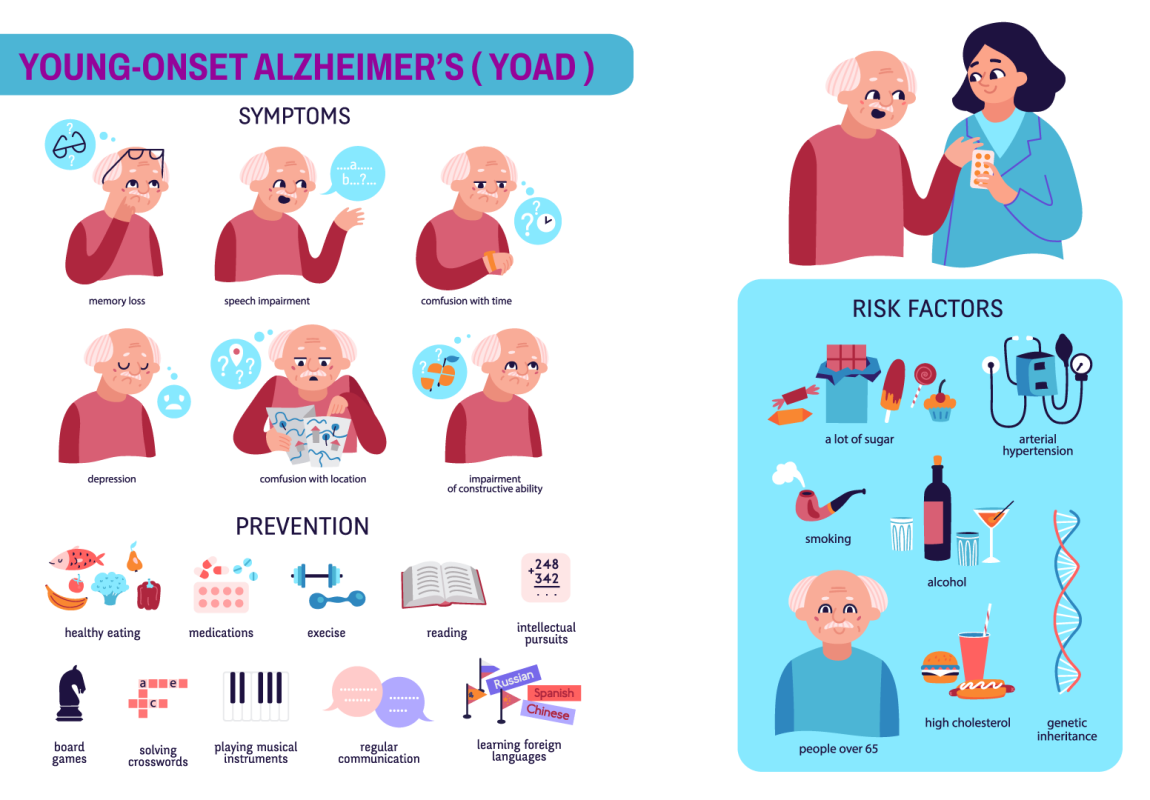
Young-Onset Alzheimer's - What is it?
YOAD stands for Young-Onset Alzheimer’s Disease (also referred to as Early-Onset Alzheimer’s Disease ). It is a form of Alzheimer’s disease that affects individuals who are younger than 65 years old, typically between their 30s and mid-60s. While Alzheimer’s disease is most commonly associated with older adults, YOAD accounts for approximately 5-10% of all Alzheimer’s cases, making it relatively rare but still significant.
Age of Onset :
- YOAD is diagnosed in individuals under the age of 65, with symptoms often appearing in their 40s, 50s, or early 60s.
- In contrast, late-onset Alzheimer’s typically begins after age 65.
Symptoms :
- The symptoms of YOAD are similar to those of late-onset Alzheimer’s but may manifest differently depending on the individual.
- Common symptoms include:
- Memory loss, particularly short-term memory.
- Difficulty with language (e.g., finding words or following conversations).
- Impaired judgment and problem-solving abilities.
- Challenges with spatial awareness or visual perception.
- Changes in mood or behavior, such as depression, irritability, or apathy.
- Difficulty performing familiar tasks at work or home.
Progression :
- Like late-onset Alzheimer’s, YOAD is a progressive disease, meaning symptoms worsen over time. However, the progression of YOAD can sometimes be faster than in late-onset cases.
Causes of Young-Onset Alzheimer’s Disease:
The exact cause of YOAD is not fully understood, but several factors may contribute:
Genetic Factors :
- A small percentage of YOAD cases (around 10%) are caused by genetic mutations that are inherited in an autosomal dominant pattern. These mutations are found in three genes:
- Amyloid precursor protein (APP) gene
- Presenilin 1 (PSEN1) gene
- Presenilin 2 (PSEN2) gene
- Individuals with these mutations tend to develop Alzheimer’s at a younger age, often in their 30s, 40s, or 50s.
- This form of YOAD is sometimes referred to as familial Alzheimer’s disease (FAD) .
- A small percentage of YOAD cases (around 10%) are caused by genetic mutations that are inherited in an autosomal dominant pattern. These mutations are found in three genes:
Non-Genetic Factors :
- For the majority of YOAD cases, the cause is not directly linked to genetic mutations. Risk factors may include:
- Cardiovascular health : Conditions like high blood pressure, diabetes, and high cholesterol may increase the risk.
- Lifestyle factors : Poor diet, lack of exercise, smoking, and excessive alcohol consumption may contribute.
- Traumatic brain injury (TBI) : A history of head injuries may increase the risk of developing Alzheimer’s at a younger age.
- Other neurological conditions : Some studies suggest a link between YOAD and other neurodegenerative diseases.
- For the majority of YOAD cases, the cause is not directly linked to genetic mutations. Risk factors may include:
Diagnosis of Young-Onset Alzheimer’s Disease:
Diagnosing YOAD can be challenging because the symptoms often overlap with other conditions, and younger individuals may initially attribute memory problems to stress, fatigue, or other factors. The diagnostic process typically includes:
Medical History and Cognitive Testing :
- A detailed medical history, including family history of dementia.
- Cognitive tests to assess memory, language, problem-solving, and other mental functions.
Neurological Exams :
- Evaluations of motor skills, reflexes, coordination, and sensory function.
Brain Imaging :
- MRI or CT scans to rule out other causes of cognitive decline (e.g., tumors, strokes, or brain injuries).
- PET scans to detect amyloid plaques or tau tangles, which are hallmarks of Alzheimer’s disease.
Blood Tests :
- To rule out other potential causes of symptoms, such as vitamin deficiencies, thyroid disorders, or infections.
Genetic Testing :
- In cases where there is a strong family history of Alzheimer’s, genetic testing may be recommended to identify mutations in the APP, PSEN1, or PSEN2 genes.
Challenges of Young-Onset Alzheimer’s Disease:
Delayed Diagnosis :
- Because Alzheimer’s is typically associated with older adults, younger individuals may face delays in diagnosis. Symptoms may be mistaken for stress, depression, or other conditions.
Impact on Work and Finances :
- Many individuals with YOAD are still in the workforce when symptoms begin, leading to job loss or difficulty maintaining employment.
- Financial strain can result from medical expenses, loss of income, and the need for caregiving support.
Family Dynamics :
- YOAD can place a significant emotional and financial burden on families, especially if the individual has young children or dependent relatives.
- Spouses or partners may need to take on caregiving roles while managing work and household responsibilities.
Social Isolation :
- Individuals with YOAD may feel isolated because they are younger than most people with Alzheimer’s and may not fit into traditional support groups or communities.
Treatment and Management of YOAD:
While there is no cure for Alzheimer’s disease, treatments and interventions can help manage symptoms and improve quality of life:
Medications :
- Cholinesterase inhibitors (e.g., donepezil, rivastigmine, galantamine) can help improve memory and cognitive function in the early and middle stages.
- Memantine may be prescribed for moderate to severe Alzheimer’s to help regulate glutamate, a chemical involved in brain function.
Lifestyle Modifications :
- Regular physical exercise, a healthy diet, and mental stimulation (e.g., puzzles, reading) can help slow cognitive decline.
- Managing cardiovascular risk factors (e.g., hypertension, diabetes) is also important.
Support Services :
- Counseling and support groups for both individuals with YOAD and their caregivers.
- Occupational therapy to help individuals maintain independence in daily activities for as long as possible.
Clinical Trials :
- Individuals with YOAD may be eligible to participate in clinical trials testing new treatments or therapies.
Conclusion:
Young-Onset Alzheimer’s Disease (YOAD) is a devastating condition that affects individuals earlier in life, often during their prime working and family years. While it shares many similarities with late-onset Alzheimer’s, YOAD presents unique challenges related to diagnosis, treatment, and its impact on work, finances, and family dynamics. Early diagnosis and access to appropriate care and support are critical for managing the disease and improving quality of life for both individuals with YOAD and their families.


